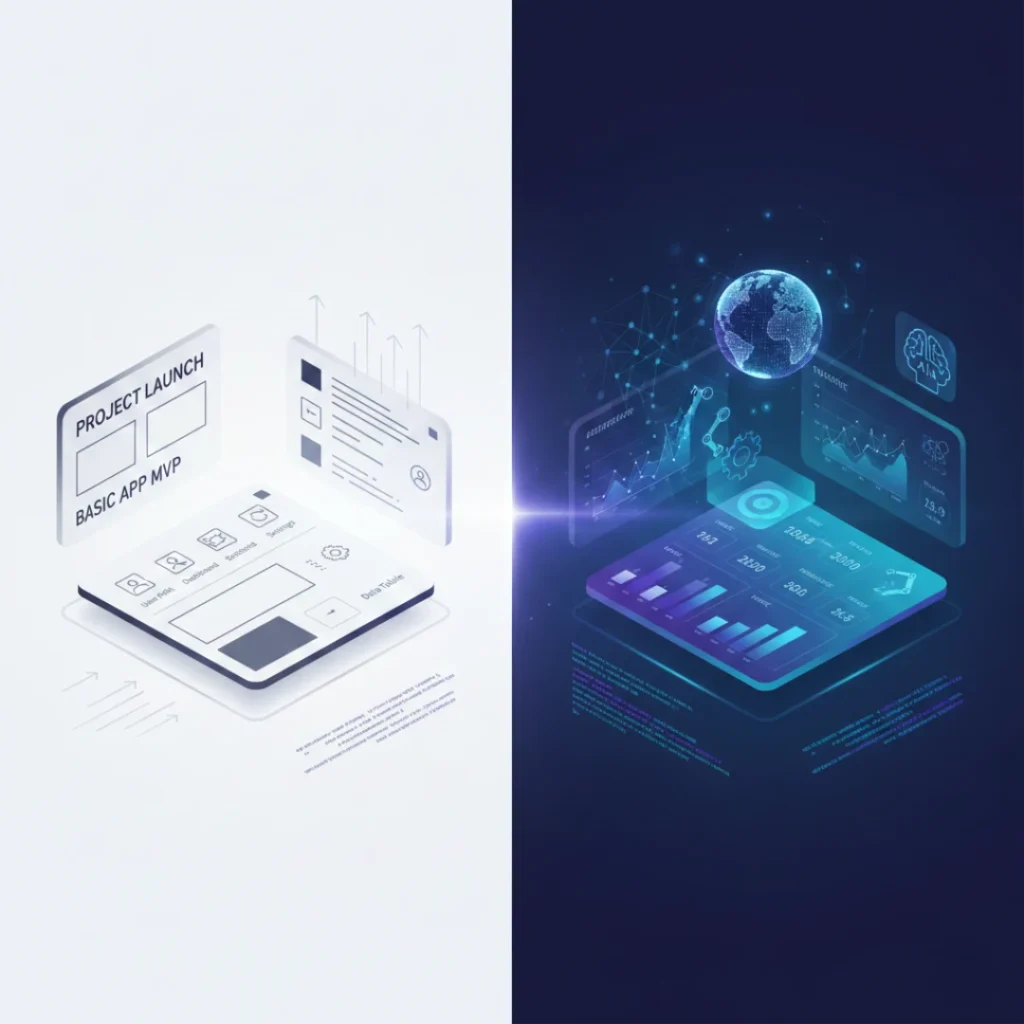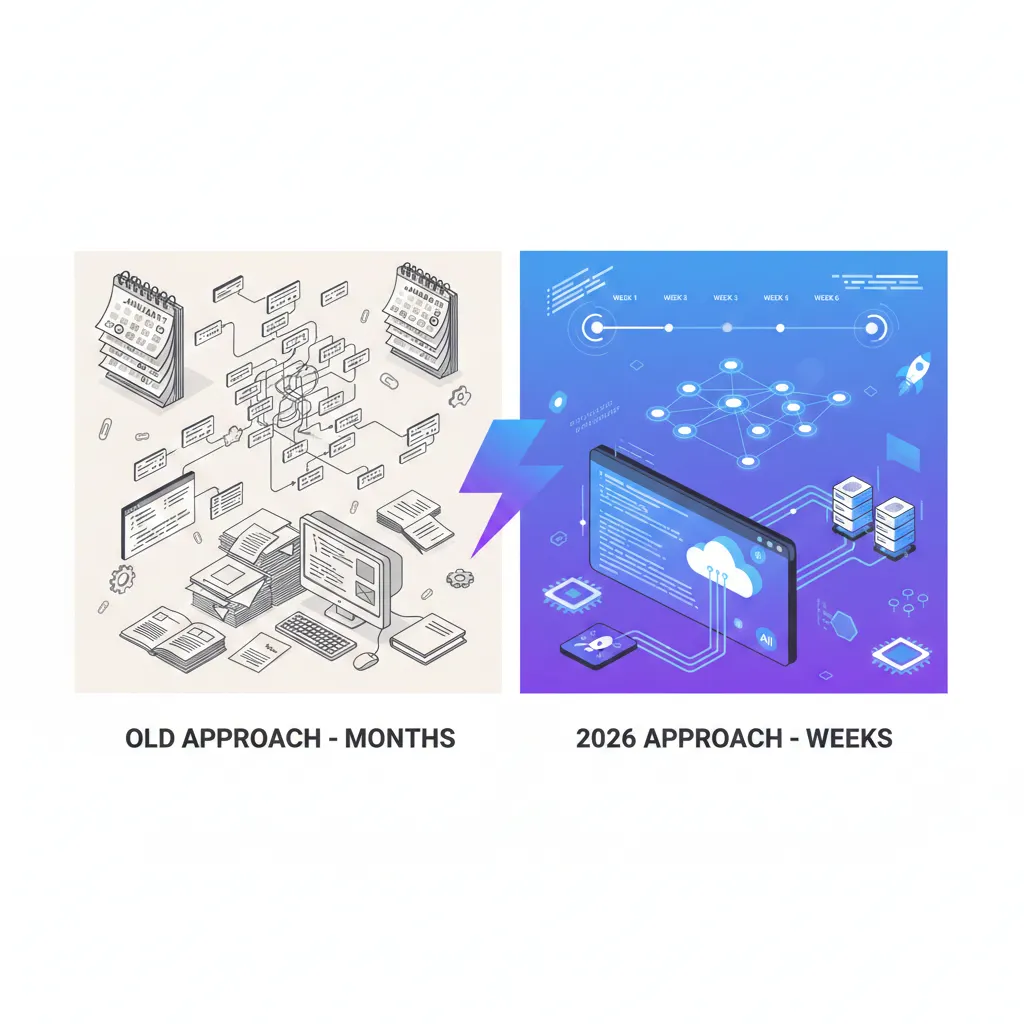Picture this scenario: You’re sitting in a boardroom, watching competitors announce AI powered features that make your current software look outdated. Meanwhile, you’re still manually processing data that could be automated, missing insights that AI could surface instantly, and wondering how to catch up without breaking your budget or compromising your data security.
Sound familiar? You’re definitely not alone. The AI revolution isn’t coming anymore – it’s here, and businesses that adapt quickly are gaining significant competitive advantages while others struggle to keep pace.
But here’s the thing: implementing AI software development isn’t just about jumping on the latest technology trend. It’s about strategically integrating intelligent systems that solve real business problems, enhance your existing processes, and position your company for sustainable growth.
What Makes AI Software Development Different?
Traditional software development follows predictable patterns. You define requirements, write code, test functionality, and deploy. AI software development adds layers of complexity and opportunity that completely transform this process.
Unlike conventional applications that follow predetermined logic paths, AI software learns, adapts, and makes decisions based on data patterns. This means your software becomes more valuable over time, discovering insights and optimizing processes in ways that static code simply cannot achieve.
The key difference lies in how artificial intelligence systems handle uncertainty and complexity. While traditional software requires explicit programming for every scenario, AI software can generalize from examples and handle situations it has never encountered before.
Core Components of Modern AI Software Development
Intelligent Data Processing
At the heart of every successful AI application lies sophisticated data processing capabilities. Modern AI software doesn’t just store and retrieve information – it understands context, identifies patterns, and extracts meaningful insights from structured and unstructured data sources.
This involves natural language processing for understanding human communication, computer vision for analyzing visual content, and predictive analytics for forecasting trends and behaviors. The result is software that can process information more like a skilled analyst than a simple database.
Machine Learning Integration
Machine learning transforms static software into dynamic, evolving systems. Through carefully designed algorithms, your AI software can identify trends, make predictions, and continuously improve its performance based on new data and user interactions.
The sophisticated part is selecting the right machine learning approaches for your specific business challenges. Whether you need recommendation engines, fraud detection systems, or automated decision making tools, the underlying ML architecture must align with your operational requirements and scalability goals.
Adaptive User Interfaces
AI software development creates interfaces that adapt to individual users and changing contexts. Instead of one size fits all designs, AI powered interfaces can personalize experiences, anticipate user needs, and streamline workflows based on behavioral patterns.
This goes beyond simple customization settings. Advanced AI interfaces can predict what information users need, suggest optimal actions, and even automate routine tasks before users realize they need them.
Strategic Business Applications
Customer Experience Enhancement
AI software development enables personalized customer experiences that scale across thousands or millions of interactions. Intelligent customer service systems can handle complex queries, route issues to appropriate specialists, and even predict customer needs before they’re explicitly expressed.
The business impact extends beyond cost savings. AI enhanced customer experiences often result in higher satisfaction scores, increased loyalty, and improved retention rates. Your software becomes a competitive differentiator rather than just operational infrastructure.
Process Automation and Optimization
Strategic AI automation goes far beyond simple task automation. Modern AI software can manage entire workflows, make resource allocation decisions, and optimize processes across multiple departments simultaneously.
This includes supply chain optimization, financial forecasting, quality control systems, and resource planning applications. The AI components continuously analyze performance data and suggest or implement improvements automatically.
Business Intelligence and Analytics
AI software development creates analytics capabilities that surface insights human analysts might miss. Advanced pattern recognition, anomaly detection, and predictive modeling help businesses understand not just what happened, but why it happened and what’s likely to happen next.
These systems can process vast amounts of data from multiple sources, identify correlations across different business functions, and present actionable insights through intuitive dashboards and automated reports.
Custom AI Development vs Off the Shelf Solutions
When Custom Development Makes Sense
Every business has unique processes, data structures, and competitive requirements. Custom AI development becomes essential when your competitive advantage depends on proprietary algorithms, specialized industry knowledge, or unique data processing requirements.
Custom development also provides complete control over data privacy, security protocols, and integration with existing business systems. This is particularly important for organizations handling sensitive information or operating in highly regulated industries.
Hybrid Approaches for Optimal Results
Many successful AI implementations combine custom development with proven platforms and frameworks. This approach accelerates development timelines while ensuring the final solution meets specific business requirements.
The key is identifying which components need custom development and which can leverage existing technologies. Experienced development teams can design architectures that maximize both efficiency and customization.
Industry Specific AI Software Solutions
Healthcare and Medical Applications
AI software development in healthcare requires specialized expertise in regulatory compliance, data security, and clinical workflows. Applications range from diagnostic assistance systems to patient monitoring platforms and treatment optimization tools.
The complexity involves not just technical development but also understanding medical terminology, clinical processes, and regulatory requirements that govern healthcare software deployment.
Financial Services and Fintech
Financial AI software must handle real time transaction processing, fraud detection, risk assessment, and regulatory compliance simultaneously. The development process requires deep understanding of financial markets, regulatory frameworks, and security requirements.
Advanced applications include algorithmic trading systems, credit scoring models, and personalized financial advisory platforms that can adapt to changing market conditions and individual client needs.
Manufacturing and Industrial Applications
Industrial AI software focuses on predictive maintenance, quality control, supply chain optimization, and production planning. These applications often integrate with existing manufacturing systems and require robust performance under demanding operational conditions.
The development process must account for industrial protocols, real time processing requirements, and integration with legacy manufacturing equipment and systems.
Development Methodology and Best Practices
Agile AI Development Processes
AI software development benefits from iterative approaches that allow for continuous testing, learning, and refinement. Unlike traditional software where requirements are fixed, AI projects often involve discovering optimal approaches through experimentation and data analysis.
This means development teams must be comfortable with uncertainty and ready to pivot based on data insights and performance results. The methodology must balance structured project management with flexibility for innovation and discovery.
Data Strategy and Management
Successful AI software development requires careful attention to data quality, accessibility, and governance. The development process must include data collection strategies, cleaning and preparation protocols, and ongoing data management systems.
Poor data quality can undermine even the most sophisticated AI algorithms, while well managed data assets can enhance AI performance and enable new capabilities over time.
Testing and Validation Frameworks
AI software requires specialized testing approaches that go beyond traditional functional testing. This includes algorithm performance testing, bias detection, edge case analysis, and continuous monitoring of AI model accuracy and behavior.
The testing framework must also account for AI systems that learn and evolve over time, ensuring consistent performance and detecting potential issues before they impact business operations.
Security and Privacy Considerations
Data Protection and Privacy
AI software development must prioritize data protection from the initial design phase. This includes encryption protocols, access controls, audit trails, and compliance with regulations like GDPR, HIPAA, and industry specific privacy requirements.
Privacy by design principles ensure that AI systems collect only necessary data, process it securely, and provide users with appropriate control over their information.
AI Model Security
Protecting AI models from adversarial attacks, data poisoning, and unauthorized access requires specialized security measures. This includes secure model training environments, encrypted model storage, and robust authentication systems for AI service access.
The security framework must also address potential vulnerabilities unique to AI systems, such as model inversion attacks and training data extraction attempts.
Deployment and Scaling Strategies
Cloud vs On Premises Deployment
AI software deployment decisions impact performance, security, cost, and scalability. Cloud deployments offer flexibility and scalability but may raise data sovereignty concerns. On premises deployments provide maximum control but require significant infrastructure investment.
Many organizations opt for hybrid approaches that keep sensitive data on premises while leveraging cloud resources for computational intensive AI processing tasks.
Performance Optimization
AI software often requires significant computational resources, making performance optimization crucial for both user experience and operational costs. This includes algorithm optimization, efficient data processing pipelines, and intelligent caching strategies.
AI and ML development services must include ongoing performance monitoring and optimization to ensure systems remain efficient as data volumes and user loads increase.
Integration with Existing Business Systems
API Design and Integration
Modern AI software must integrate seamlessly with existing business applications, databases, and workflows. This requires careful API design that enables real time data exchange while maintaining system performance and security.
The integration architecture must also account for different data formats, communication protocols, and system availability requirements across various business applications.
Change Management and User Adoption
Successful AI software implementation requires comprehensive change management strategies that help users understand and adopt new capabilities. This includes training programs, gradual rollout strategies, and ongoing support systems.
User adoption often determines the ultimate success of AI software projects, making user experience design and change management as important as technical development capabilities.
Measuring Success and ROI
Key Performance Indicators
AI software success requires carefully selected metrics that align with business objectives. Technical metrics like model accuracy must be balanced with business metrics like cost savings, revenue impact, and user satisfaction.
The measurement framework should also include leading indicators that help predict long term success and identify potential issues before they impact business operations.
Continuous Improvement Processes
AI software development doesn’t end with deployment. Continuous monitoring, performance analysis, and iterative improvements ensure that AI systems continue delivering value as business needs evolve and data patterns change.
This includes regular model retraining, feature updates, and capability expansions based on user feedback and changing business requirements.
Future Trends in AI Software Development
Emerging Technologies and Capabilities
The AI software development landscape continues evolving rapidly with advances in large language models, multimodal AI systems, and edge computing capabilities. These technologies enable new applications and improved performance for existing use cases.
Staying current with emerging technologies helps ensure that AI software investments remain valuable and competitive over time.
Industry Standards and Best Practices
As AI software becomes more prevalent, industry standards for development, deployment, and governance continue maturing. Following emerging best practices helps ensure long term viability and reduces technical debt.
This includes standards for AI ethics, explainability, and interoperability that are becoming increasingly important for enterprise AI deployments.
Choosing the Right Development Partner
Technical Expertise and Experience
Successful AI software development requires deep expertise in machine learning, software architecture, and domain specific knowledge. The right development partner should demonstrate proven experience with similar projects and the ability to navigate complex technical challenges.
Look for teams that understand both the technical aspects of AI development and the business context that drives project requirements and success criteria.
Ongoing Support and Maintenance
AI software requires ongoing maintenance, monitoring, and updates that go beyond traditional software support. The development partner should provide comprehensive support services that ensure continued performance and capability enhancement.
This includes model maintenance, performance optimization, security updates, and capability expansions as business needs evolve.
Getting Started with AI Software Development
Assessment and Planning
Beginning your AI software development journey requires thorough assessment of current systems, data assets, and business objectives. This analysis helps identify optimal AI applications and establish realistic timelines and expectations.
The planning process should also include risk assessment, resource allocation, and success criteria that guide development decisions and measure project outcomes.
Pilot Projects and Proof of Concepts
Starting with focused pilot projects allows organizations to gain experience with AI software development while minimizing risk and investment. Successful pilots can then be expanded and integrated with broader business systems.
The pilot approach also provides valuable learning opportunities that inform larger AI initiatives and help refine development processes and success criteria.
Conclusion: Transforming Business Through Intelligent Software
AI software development represents a fundamental shift in how businesses can leverage technology for competitive advantage. Rather than simply automating existing processes, AI software creates new capabilities that transform how organizations operate, serve customers, and make strategic decisions.
The key to success lies in approaching AI software development strategically, with clear business objectives, realistic expectations, and the right technical expertise. When implemented thoughtfully, AI software becomes a powerful engine for innovation, efficiency, and growth.
Whether you’re just beginning to explore AI possibilities or looking to expand existing capabilities, the investment in intelligent software development can deliver transformative results that position your business for long term success in an increasingly competitive marketplace.
The future belongs to organizations that can harness the power of artificial intelligence to solve complex problems, delight customers, and optimize operations. The question isn’t whether AI software development is worth the investment, but rather how quickly you can begin realizing its benefits.
Ready to transform your business with intelligent AI software solutions? At Zackriya Solutions, we specialize in developing custom AI applications that deliver measurable business results while maintaining the highest standards of security and performance. Our experienced team combines deep technical expertise with practical business understanding to create AI software that truly works for your organization.
Contact us today to discuss how we can help you harness the power of artificial intelligence to solve your unique business challenges and accelerate your growth.
Frequently Asked Questions
AI software development involves creating applications that can learn, adapt, and make intelligent decisions based on data patterns, unlike traditional software that follows predetermined logic paths.
Custom AI software development timelines vary significantly based on project complexity, data availability, and integration requirements, typically ranging from 3-12 months for most business applications. Simple AI features might take 6-12 weeks, while complex enterprise systems with multiple AI components can require 12-18 months. The timeline includes phases like data preparation, model training, testing, integration, and deployment, with iterative refinements based on performance results.




